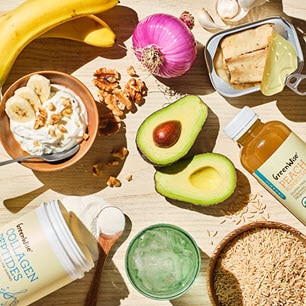
Published September 1, 2024
September is Healthy Aging Month, and taking care of our skin as we age is an important topic to consider.
When skin meets the environment, it begins to show signs of aging, such as wrinkling and loss of elasticity.1 While there are many ways to support the largest organ in your body, what you feed your skin impacts its health. It starts on the inside.2
Let’s explore some of the macronutrients you can add—or limit—to support your body’s skin health.
Choose fats wisely.
Not all dietary fat is created equally. When looking to nourish your skin from the inside out, focus on fats coming from whole foods. Polyunsaturated fats and monounsaturated fats have been shown to have a protective effect on skin aging, largely due to their anti-inflammatory properties.3 Some good sources of unsaturated fats that you can find at your neighborhood Publix include avocados, nuts, and certain fish such as salmon and sardines. Be sure to consider various factors for when and how to integrate dietary fats.
Presenting pre- and probiotics.
Prebiotics from fiber and probiotics work together to support a healthy microbiome in the gut, which plays a role in skin health in a relationship called the gut-skin axis.
Prebiotic sources include sauerkraut, kombucha, and kimchi.
Recent studies show that probiotics can help improve signs of skin aging by reducing oxidative stress and photodamage. Probiotics can also improve the skin barrier overall.4 Prebiotics and probiotics act on this gut-skin axis and can benefit skin conditions by improving skin hydration, gloss, and elasticity.4
Some sources of probiotics include yogurt, whole grains, bananas, garlic, and onions.
Call on collagen.
Collagen is a supportive protein that can be found in the skin. Current research suggests that the use of collagen may rejuvenate skin, reduce wrinkles, and cause some reversal in skin aging by hydrating skin and improving elasticity.4 Learn more about collagen here.
Ready to give collagen a try? Check out our GreenWise Collagen Peptides. You can also find collagen in bone broth, sardines, and salmon with skin.
Drink up.
Ensuring your body stays properly hydrated is a key player in overall skin hydration. Drinking enough water has been suggested to positively impact normal skin physiology and hydration status.5 Learn more about the benefits of staying hydrated.
Many factors play a role in supporting skin health. As always, please be sure to consult with your doctor or registered dietitian before making any drastic changes to your diet.
To learn more ways your dietary choices can affect your skin’s healthy aging, be sure to check out, Four Vitamins that Support Skin Health. And if you have any questions, please feel free to email our team of dietitians.
For the love of you.
Choosing how you eat is uniquely personal. It’s about your needs, your preferences, and your goals. As your wellness ally, we’re in your corner with fresh ideas, recipes, and wellness icons that make it easier to shift toward wiser food choices. It’s all about you, at your very best.
Sources
1Mohiuddin, Abdul Kader. Skin Aging & Modern Age Anti-Aging Strategies. ResearchGate. August 2019.
2Cao, Changwei, Zhichao Xiao, Yinglong Wu, and Changrong Ge. Diet and Skin Aging—From the Perspective of Food Nutrition. National Library of Medicine. March 24, 2020.
3Solway, Jason, Michael McBride, and Furqan Haq, et al. "Diet and Dermatology." Journal of Clinical and Aesthetic Dermatology. May 2020.
4Ratanapokasatit, Yanisa, Wannada Laisuan, and Teerapong Rattananukrom, et al. How Microbiomes Affect Skin Aging: The Updated Evidence and Current Perspectives. National Library of Medicine. June 22, 2022.
5Al-Atif, Hend. Collagen Supplements for Aging and Wrinkles: A Paradigm Shift in the Fields of Dermatology and Cosmetics. Dermatology Practical & Conceptual. January 2022.

 You are about to leave publix.com and enter the Instacart site that they operate and control. Publix’s delivery and curbside pickup item prices are higher than item prices in physical store locations. Prices are based on data collected in store and are subject to delays and errors. Fees, tips & taxes may apply. Subject to terms & availability. Publix Liquors orders cannot be combined with grocery delivery. Drink Responsibly. Be 21. For prescription delivery, log in to your pharmacy account by using the Publix Pharmacy app or visiting
You are about to leave publix.com and enter the Instacart site that they operate and control. Publix’s delivery and curbside pickup item prices are higher than item prices in physical store locations. Prices are based on data collected in store and are subject to delays and errors. Fees, tips & taxes may apply. Subject to terms & availability. Publix Liquors orders cannot be combined with grocery delivery. Drink Responsibly. Be 21. For prescription delivery, log in to your pharmacy account by using the Publix Pharmacy app or visiting